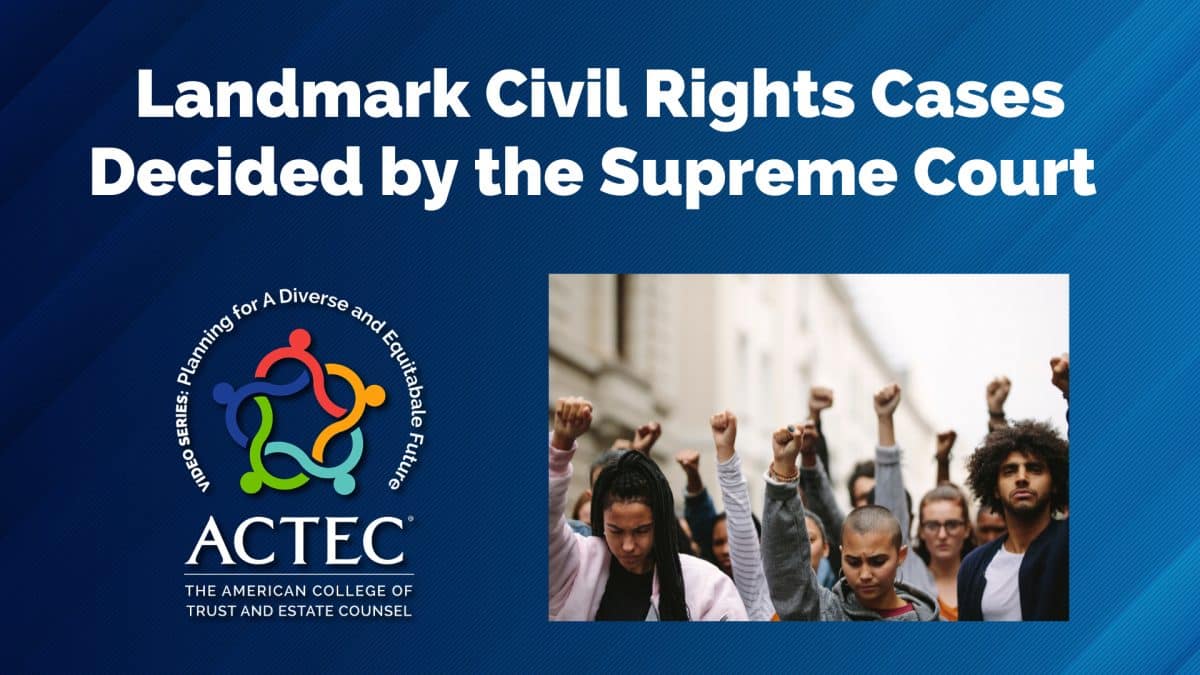Transgender or “trans” people may decide to change their legal name and/or gender marker as part of their journey to live as their authentic self. Many wealth and estate planning professionals are not familiar with the steps necessary to accomplish these updates, or with issues specific to financial and estate planning for the LGBTQ community.
ACTEC Fellows Cynthia G. Lamar-Hart and Paula A. Kohut share introductory information for practitioners and for the general public about these processes, such as:
- Terminology and etiquette;
- What documents can be updated as to legal name and/or gender;
- Recent legal precedent;
- General guidance on the steps for changing state records (legal name, driver’s license, birth certificate) and federal records (passport, social security);
- Where to obtain forms and instructions for the letter required for updating federal records, with a caution that states may require different documentation;
- Where to go for a state-by-state guide to updating name and/or gender marker;
- Recent legal precedent regarding federal anti-discrimination protection;
- What estate planning documents to consider (healthcare directive, will, power of attorney, legal guardian) and where to go for more information.
Resources
For Estate Planning Professionals
- Estate Planning for Gay, Lesbian, Bisexual and Transgender Clients: Statutory Surrogates, Regulatory Changes, Health Care Powers of Attorney & Related Considerations – Article by Paula A. Kohut Published by the Estate Planning & Fiduciary Law Section of the North Carolina Bar Association (Section Vol. 31, No. 3, April 2012)
- Creating End-of-Life Documents for Trans Individuals: An Advocate’s Guide – Produced by Whitman-Walker Health
For General Public
- National Center for Transgender Equality – The one-stop hub for how to update name and gender on vital state and federal records.
- GLAAD Media Reference Guide – an overview of LGBTQ rights, terminology, and information created for journalists but helpful to all interested parties.
- Lambda Legal – Changing birth certificate gender designations by state.
- Transgender Legal History in the United States – Information on trans legal history by Wikipedia.
- Gerald Lynn Bostock v. Clayton County, Georgia – June 15, 2020 Supreme Court of the US decision regarding employee legal rights for homosexual or transgender people.
- Changing Your Name, Not Your Credit Score: Helping Transgender and Non-binary People with Name Changes and Credit Reports
Transcript
Introduction
Terrence M. Franklin: Hi, I’m Terry Franklin. My pronouns are he, his and him. Traditionally, many women can relate to updating vital records such as a driver’s license, passport, bank accounts, social security – even a library card after getting married and changing their name.
For transgender individuals, this is more complicated. The need to change not only their legal name but potentially their gender may involve updating vital records such as their birth certificate with the state and federal government. ACTEC Fellows Cynthia Lamar-Hart and Paula Kohut share their knowledge with trans people and members of the legal community looking for reliable information on steps to modify legal documents.
Cynthia Lamar-Hart: My name is Cynthia Lamar-Hart, and my pronouns are she/her/hers. I am an ACTEC Fellow and estate planner in Birmingham, AL. About a decade ago, I began working with transgender and non-binary clients to assist them with changes to their vital records, which include name change, gender-marker change and federal records changes – and I quickly learned that the transgender community is drastically underserved for these basic legal services.
At the same time, there is a great deal of misinformation and confusion out in the public discourse – and even in the courts – regarding how these very fundamental processes are accomplished. For this reason, my firm supported me in starting a clinic to provide pro bono legal services relating to vital records changes to the trans community, and we have now served nearly 200 clients from across the nation and many foreign countries. My discussion today will be focused on these nuts and bolts, why this is important and how we in the legal community can be of help.
My colleague here today is Paula Kohut, who is also an ACTEC Fellow who practices in North Carolina. Paula, please tell us about your practice and what you will focus on in your remarks.
Paula Kohut: My name is Paula Kohut and my pronouns are she/her/hers. I am also an ACTEC Fellow and an estate planning lawyer in Wilmington, North Carolina. In 2011, at the age of 53, I began living my life authentically and transitioned from Paul to Paula. As part of my transition, I began learning about the unique challenges that LGBTQ people deal with in connection with estate planning for themselves and their families. Today, many of my estate planning clients are LGBTQ. While there have been a lot of positive changes in the law for LGBTQ persons since 2011, a lot remains to be done.
Cynthia Lamar-Hart: Paula, before discussing the process for changing vital records, what are some of the basic concepts estate planners should know regarding transgender clients or beneficiaries?
Basic Concept Estate Planners Should Know About Transgender Clients or Beneficiaries
Paula Kohut: Well, the first transgender, which is an adjective referring to someone whose gender identity – that is, their internal sense of gender – does not match their sex identified at birth. Cisgender, and that’s c-i-s, is a person whose gender identity matches their sex identified at birth. Similarly, some people consider themselves to be non-binary and do not identify with a specific gender.
Gender identity is distinct from sexual orientation and varies among transgender people as it does for everyone. A transgender person can be gay, lesbian, straight or bi-sexual. It is also important to understand that whether a transgender person chooses to undergo any medical interventions is a private matter and not appropriate to inquire about. There is a limited exception in an attorney-client relationship if and only if it is relevant to the representation, such as discussing the law relative to updating the gender on a birth certificate. Please be sure to visit the resource webpage for this video – actec.org/diversity/transgender – for a link to GLAAD’s Media Reference Guide for terminology unique to the LGBTQ community.
Finally, whether someone is transgender is private, and it should be considered confidential, except to the extent the transgender person chooses to disclose it. While I am very open about my gender identity, the decision to be open or confidential about one’s gender identity is personal to the individual.
Cynthia, please tell us why it is important for trans individuals to have vital records that match their identified name and gender.
Updating Vital Records of Transgender People to Match Identity
Cynthia Lamar-Hart: Thanks, Paula. There are several reasons why it is imperative that trans individuals have identity documents that match their name and gender identity. The first is one, that we can all understand is: It can be annoying or embarrassing for any of us to be called by the wrong name or to be lumped into a category that is not accurate for us based on assumptions or prejudices. The same is true for trans individuals. It is a matter of courage for them to obtain identity documents that match their identified name and gender, and it is a matter of common courtesy and respect for others who interact with them to use their proper name and pronouns.
The second reason is one that you may not expect, and that is one of safety and security. The statistics for violent crimes and hate crimes against LGBQ individuals and trans individuals, in particular, are alarming, with trans women of color being among the most vulnerable populations in the world, including here in the U.S. When one’s gender identity can be a matter of life and death, it is particularly important that one’s vital records accurately reflect one’s gender identity. Also, having corrected Social Security records and updated identity documentation can help to avoid confusion, harassment or even outright discrimination in the workplace.
Thankfully, in June of 2020, in Bostock v. Clayton County, the United States Supreme Court held that Title VII bars employment termination on the basis of sexual orientation and gender identity. That had not been the law previously in several Federal Circuits, including my own. While this is very important progress, we expect that there may be exceptions to or exemptions from this extension of Title VII and that its application may not be seamless. For these reasons, we know that having updated identity documentation can be important for financial security as well.
Paula Kohut: Cynthia, what records can be changed and tell us generally how that can be accomplished?
Cynthia Lamar-Hart: Essentially, all of a person’s vital records documents can be updated. While every state has its own set of laws and procedures, I can give you a general overview of the steps. Typically, the first step is to obtain a name change order. In most states, this is accomplished in the probate court of the county in which the individual resides; and note that parents can undertake this process for their minor children as well. Usually, one does not need a lawyer to accomplish this, but rather the probate court often can provide forms for the individual’s use in obtaining a name change order.
With this name change order in hand, the individual can change his, her or their name across the board – at work, at school and in-school records, with Social Security, Voter Registration and on the driver’s license, the passport, on credit cards and bank accounts, in a will and other estate planning documents.
The next step, if desired, would be to obtain the so-called “federal letter” and any necessary “state letter” to change one’s gender-marker. This is a letter from the individual’s physician certifying the individual’s transition to the identified gender. The form for the federal letters for the Department of State, which is where you would update a passport and Social Security, along with instructions, can be obtained online.
Changing the gender-marker on the birth certificate is governed by the laws of the state or jurisdiction where the individual was born. If in the state of the client’s birth, a letter is required for state law purposes to change the gender-marker on the birth certificate and/or driver’s license, then that state-specific letter may be different from the federal letters.
Some states also require a court order to change a gender-marker. This is where it is helpful to have a lawyer to assist the individual in gathering the documentation required in that particular state and in preparing and filing the necessary petition and proposed order.
Please visit the web resource pages for this video for more information and a link to the Trans Legal Services Network, which is hosted online by the National Center for Transgender Equality. This site provides state-by-state guidance for vital records changes and a list of member organizations and firms that offer legal services for vital records changes.
Once the birth certificate is corrected or, in some states amended, then that can be used to update the driver’s license. Again, every state is different in what may be required to accomplish this.
Also note that in many states, there are even county-by-county differences in the forms and fees and processes for name and gender-marker change orders, and attorneys can be of assistance in helping clients navigate those requirements. Also, it can be intimidating for individuals who are not used to appearing in these matters without a lawyer, and having counsel present can be of tremendous comfort to the individual and can be helpful to the court, who may see these types of petitions only rarely.
Paula, are there any unique estate planning issues relative to transgender clients and clients with transgender beneficiaries?
Unique Estate Planning Issues Related to Transgender Clients and Beneficiaries
Paula Kohut: Thank you, Cynthia. In addition to a will and a Durable Power of Attorney, it is very important to have healthcare powers of attorney in place. When someone does not have a healthcare power of attorney in place, the law in most states says the next of kin determines who will make healthcare decisions if a person is unable to make their own. For many transgender and LGBTQ clients, there may be family members who will not respect their gender identity or relationships. So, the healthcare agent can help assure that healthcare providers, family and visitors respect the client’s gender identity and related relationships.
Although most healthcare powers of attorney authorize the healthcare agent to make funeral arrangements, it is a good idea if someone other than the next of kin is to make those funeral arrangements to set forth that authority in a separate document – have that authority set forth in a separate document. In North Carolina, I prepare an Appointment of Agent for Disposition of Final Remains, which follows the North Carolina statute allowing a person to designate who is in charge of one’s final affairs.
I always ask clients who self-identify as LGBTQ if they have family members who may not recognize their gender identity or sexual orientation and expressly exclude such persons as fiduciaries and potential guardians. The same holds true for parents of transgender children. It is important for parents to exclude family members who could seek to disaffirm the child’s gender identity if the parents died while the child was a minor.
Another consideration to keep in mind is that there is still a lot of political division concerning transgender rights, as well as legislative and regulatory action, both favorable and unfavorable. An estate planner needs to prepare estate planning documents with a view toward their use in a jurisdiction which may be hostile to their client’s rights. And finally, clients who are LGBTQ and have supportive family members are always appreciative when their estate planner knows the status of current challenges to LGBTQ equality and equity.
Cynthia Lamar-Hart: Thank you, Paula, for those important insights into working with LGBTQ clients. We hope we have provided information that is helpful to those of you seeking legal services and to attorneys who are interested in assisting clients in the LGBTQ community. Thank you.
Conclusion
Terrence M. Franklin: Cynthia and Paula outlined some of the challenges that transgender individuals face updating their vital records as well as topics and scenarios legal advisors need to consider when assisting clients with their estate planning needs and legal documentation. Make an intentional action to learn more about the LGBTQ community. Please visit actec.org/diversity for a list of resources on this topic.
Featured Video
Landmark Civil Rights Cases Decided by the Supreme Court
Author and Professor Christopher Schmidt reviews the history of critical Supreme Court civil rights and equality cases that everyone should know.
Planning for a Diverse and Equitable Future

ACTEC’s diversity, equity, and inclusivity video series analyzes issues surrounding racism, sexism, and discrimination in all its forms to combat inequality.



